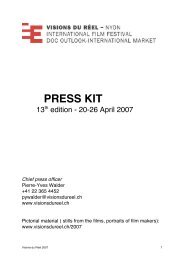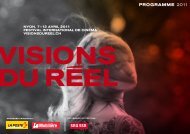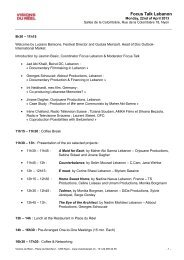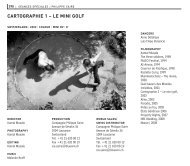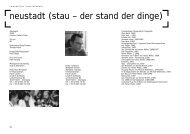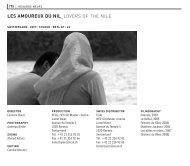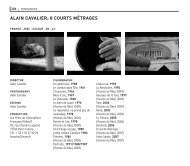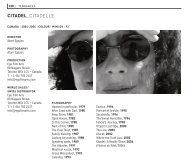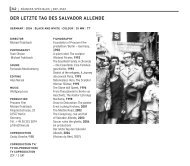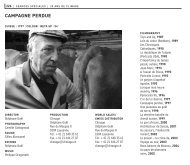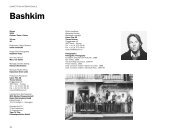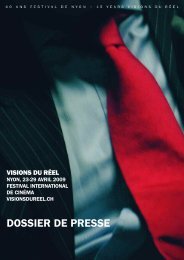Katalog 2013.pdf - Visions du Réel
Katalog 2013.pdf - Visions du Réel
Katalog 2013.pdf - Visions du Réel
You also want an ePaper? Increase the reach of your titles
YUMPU automatically turns print PDFs into web optimized ePapers that Google loves.
atelier – laila pakalnina<br />
185<br />
Laila Pakalnina<br />
Autobuss<br />
Latvia | 2005 | 58’ | 16 mm | Latvian, Estonian, Russian,<br />
Lithuanian<br />
The Bus<br />
Le bus Tallinn-Kaliningrad traverse trois<br />
frontières en une nuit : Estonie-Lettonie,<br />
Lettonie-Lituanie et Lituanie-Russie. Il<br />
parcourt les territoires de quatre pays.<br />
Ses passagers doivent utiliser quatre<br />
monnaies différentes pour payer les<br />
toilettes ou acheter des sandwichs<br />
pendant le voyage. « C’est cette situation<br />
étrange qui m’a poussé à faire ce<br />
film. Pendant l’époque soviétique, il n’y<br />
avait aucun garde-frontières sur cette<br />
route. Depuis que les trois pays baltes<br />
ont rejoint l’UE, l’histoire a également<br />
changé. Dans le bus, on expérimente<br />
plusieurs dimensions temporelles. Le<br />
temps réel s’applique au voyage (départ,<br />
arrivée). Puis, il y a le temps <strong>du</strong> bus: une<br />
heure dans le bus est différente d’une<br />
heure à l’extérieur <strong>du</strong> bus. Il y a aussi<br />
le temps de nos rêves. Et on vit dans le<br />
temps de l’histoire. La <strong>du</strong>rée <strong>du</strong> film est<br />
courte en comparaison de celle <strong>du</strong> trajet<br />
de Tallinn à Kaliningrad. Ce que nous<br />
avons essayé d’atteindre est une sorte<br />
de simultanéité entre les temps subjectifs<br />
<strong>du</strong> bus, des personnes et de l’histoire.<br />
Le bus n’est pas un simple local<br />
sur roues se déplaçant d’un endroit à un<br />
autre. Le bus est une maison temporaire<br />
pour les représentants de différentes<br />
nations et de différents milieux sociaux. »<br />
(LP)<br />
Der Bus von Tallinn nach Kaliningrad<br />
überquert in einer Nacht drei Landesgrenzen.<br />
Estland-Lettland, Lettland-<br />
Litauen und Litauen-Russland. Er<br />
überquert das Hoheitsgebiet von vier<br />
Ländern. Die Passagiere brauchen vier<br />
Währungen, um während der Reise für<br />
das WC zu zahlen oder ein Sandwich<br />
zu kaufen. « Der Grund für die Entstehung<br />
dieses Films ist das eigentümliche<br />
Wesen dieser Situation. In Sowjetzeiten<br />
gab es an dieser Strecke keine<br />
Grenzwächter. Seit die drei baltischen<br />
Länder der EU beigetreten sind, hat sich<br />
auch die Geschichte geändert. Im Bus<br />
existiert man in unterschiedlichen Zeit-<br />
Dimensionen. Die Echtzeit ist die Reisezeit<br />
(Abreise und Ankunft). Es gibt auch<br />
eine Buszeit: Eine Stunde im Bus unterscheidet<br />
sich von der Zeit draussen. Es<br />
gibt auch eine Traumzeit. Und man lebt<br />
in der Zeit der Geschichte. Verglichen<br />
mit der Reise von Tallinn nach Kaliningrad<br />
ist der Film kurz. Wir haben versucht,<br />
einen gewissen Synchronismus<br />
der subjektiven Zeit von Bus, Menschen<br />
und Geschichte zu erreichen. Der Bus<br />
ist nicht nur ein Raum auf Rädern, der<br />
sich <strong>du</strong>rch einen anderen Raum bewegt<br />
– der Bus ist das vorübergehende<br />
Zuhause der Vertreter unterschiedlicher<br />
Nationen und sozialer Schichten.» (LP)<br />
The Tallinn-Kaliningrad bus crosses<br />
three borders <strong>du</strong>ring one night:<br />
Estonian-Latvian, Latvian-Lithuanian and<br />
Lithuanian Russian. It drives over the territories<br />
of four countries. Its passengers<br />
need to use four different currencies to<br />
pay for toilets or buy sandwiches <strong>du</strong>ring<br />
the journey. “The reason for making the<br />
film is the peculiar nature of this situation.<br />
During the Soviet times there were<br />
no border guards on this route. Since the<br />
three Baltic States have joined the EU,<br />
history has changed also. In the bus you<br />
exist in different dimensions of time. The<br />
real time is actual for the travel (departure,<br />
arrival). Than there is the time of<br />
bus: an hour in the bus is different from<br />
time outside of the bus. As well you have<br />
the time of your dreams. And you live in<br />
the time of history. The running time of<br />
the film is short compared to the journey<br />
from Tallinn to Kaliningrad. What we tried<br />
to do is reach some synchronism of subjective<br />
time of bus, people, history. The<br />
bus is not just a space on wheels moving<br />
through another space, the bus is a<br />
short-term home for the representatives<br />
of different nations and different social<br />
strata.” (LP)<br />
paolo moretti<br />
Screenplay<br />
Laila Pakalnina<br />
Cinematography<br />
Alisher Hamidhodzajev,<br />
Arko Okk<br />
Sound<br />
Martti Turunen<br />
Editing<br />
Kaspar Kallas<br />
Pro<strong>du</strong>ction<br />
Laila Pakalnina (Hargla),<br />
Arko Okk (Acuba Film<br />
Pro<strong>du</strong>ction),<br />
Rasa Miskinyte (Era Film),<br />
Pertti Veijalainen<br />
Contact<br />
International Relations<br />
National Film Centre of Latvia<br />
+371 67358878<br />
nfc@nfc.gov.lv<br />
www.latfilma.lv/nfc



